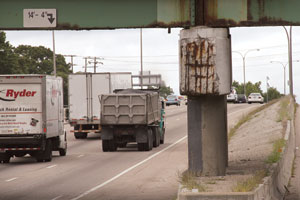R.I. Scales Back Bridge Tolling Plan but Still Targets Class 8 Trucks

This story appears in the June 8 print edition of Transport Topics.
After immediate pushback from the trucking industry, Rhode Island Gov. Gina Raimondo altered a plan to toll commercial trucks that use the state’s bridges.
Raimondo said her updated proposal, initially announced May 27, would exempt Classes 6-7 trucks but would include Class 8 and larger vehicles. No tolls would be charged to passenger vehicles.
Under Raimondo’s 10-year “RhodeWorks” plan, tolls would be set up on interstates 95, 195 and 295 and state routes 6, 10 and 146. Another change from the original plan would entail charging trucks one time per location in one day.
According to the governor’s office, the plan is projected to generate about $100 million annually, and it has the potential to create more than 10,000 jobs. The tolls would offset the cost of borrowing $700 million to make bridge repairs, starting with those in urgent need of repair.
Trucking industry reaction to the proposal was swift.
“Trucking did not create the state’s current infrastructure crisis; that was the result of years of mismanagement and massive diversion of fuel-tax and other highway user-fee revenue to fund general government expenses. And it is completely unfair that the industry be targeted to fix it,” Bill Graves, president of American Trucking Associations, said in a statement. “This plan to toll only trucks is quite literally highway robbery — stealing from our industry to paper over Rhode Island’s budget issues.”
If Rhode Island’s leaders are “serious” about fixing their infrastructure funding woes, Graves added, “they should, first and foremost, stop diverting much of their highway-related revenues to nontransportation projects.”
Raimondo’s changes did little to soften trucking’s objections.
“We can’t live with any tolling on trucks. Absolutely not,” Chris Maxwell, CEO of the Rhode Island Trucking Association, said at a June 2 press conference. He called for increasing the state’s fuel tax.
Raimondo’s proposal is part of the final version of the state budget, scheduled for a vote this week.
“Every day as governor, every day, I hear from constituents who say, ‘Governor, what are you going to do about these highways?’ “ Raimondo told reporters.
Marie Aberger, a spokeswoman for the governor, had told reporters June 2 that the median toll would be about $6 per location, with a maximum charge to cross the state ranging from $40 to $50. Aberger added that the revised toll proposal “will still generate over $100 million [a year] and provide the resources necessary to support the revenue bond.”
Aside from bridges, “RhodeWorks” also would look to boost bus and rail service, expand bike lanes and improve walkways and sidewalks. The plan also would seek to obtain $400 million more in federal matching funds for public transit projects.
Rhode Island ranks last in overall bridge condition. Nearly 200 deficient bridges make up about a fifth of the total bridge surface area around the state — the highest percentage nationally, the state DOT noted.

